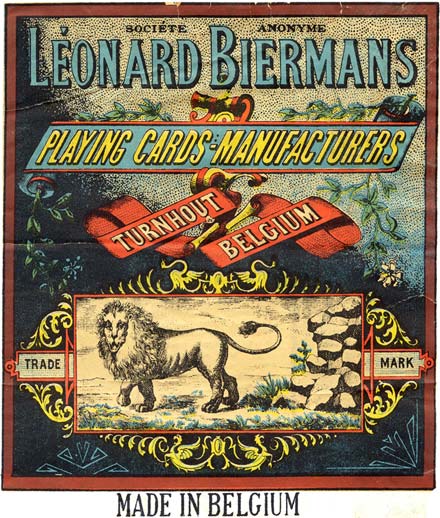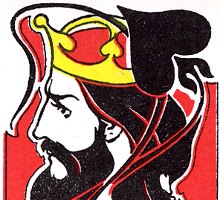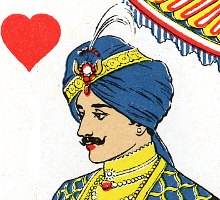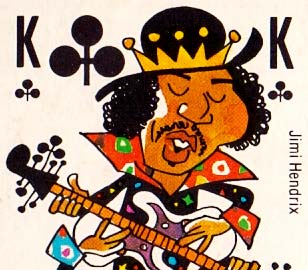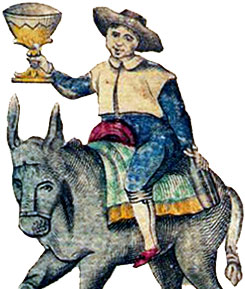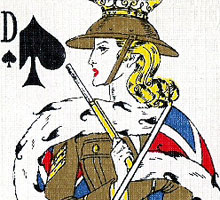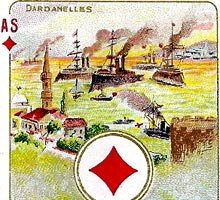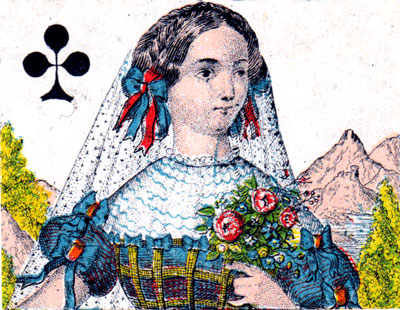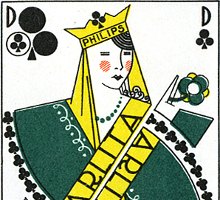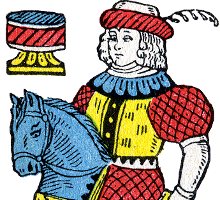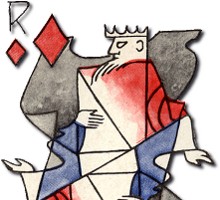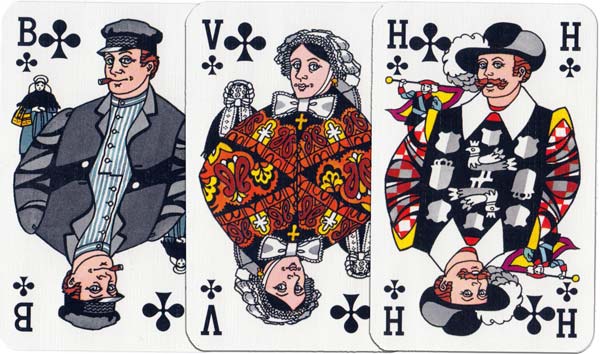Belgian Playing Cards
Belgian cardmakers have been actively designing and exporting playing cards since the 14th century.
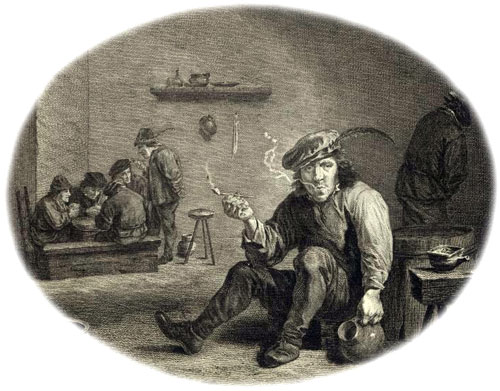
Belgian cardmakers have been actively designing and exporting playing cards since the 14th century. Some of the earliest documentary evidence about playing cards in Europe emanates from Belgium: accounts for money spent on playing cards; money lost whilst playing at cards, etc. This can partly be explained by the large number of paper manufacturers established in the area since the 14th century.
Cardmakers were usually regulated by the guild of painters in their area, and numerous accusations, complaints, orders and protections are recorded relating to cardmakers seeking to protect their monopolies over the years. There were also complaints of counterfeit goods of inferior quality with forged trade marks being smuggled into neighbouring France (Cremers, 1994).
Local areas of production emerged, such as Tournai, Namur, Liège, Amsterdam, Brussels & Dinant. Antwerp was a centre of playing card production in the 16th century. An intriguing deck featuring an obsolete Portuguese pattern with dragon aces survives by Gilis van den Bogarde dated 1567 here
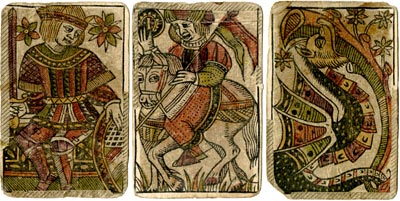
Above: cards by Gilis van den Bogarde, Antwerp 1567. These had a major influence on several styles of Japanese playing cards, after cards were introduced by Portuguese merchants.
A wrapper dated 1676, with the coat-of-arms of the Spanish branch of the Habsburgs, by Jean Constant Remy, Namur here►
Other Belgian cardmakers include Nicolas Bodet in Brussels, Gerard Bodet in Liège, J.-B Galler and François-Jean Vandenborre in Brussels, E.A Daveluy in Bruges, the Dubois firm in Liège. Belgian playing card designs were largely subjugated to local variations of French and German patterns, including tarot cards. What has become known as the standard Belgian pattern replaced earlier patterns in around 1900.
Since the nineteenth century playing cards became the most spectacular offshoot of the Turnhout printing industry. The principal card makers in Turnhout were: Brepols (1826-1970), Van Genechten (1856-1970), Glénisson (1837-99), Mesmaekers (1859-1968), Biermans (1875-1970), La Turnhoutoise (1881-1960), all of which eventually all merged into Carta Mundi (1970-present).
These manufacturers tended to offer a similar range of cards and were in close competition with each other. Some of the most common or ‘standard’ patterns associated with Belgian cardmakers are the following:
- The Bongoût pattern
- Cartes Allemandes
- Cartes Belges
- Cartes Fines
- Cartes Françaises
- Cartes Hollandaises
- Cartes Italiennes and Parisiennes
- Cartes Liégeoises
- Cartes Royales
- Cartes Suisses
- Cartes Turques
- Portuguese cards
- Spanish 'Naipes'
- Cards for the Far East
- Great Moghul
During the nineteenth century Belgian manufacturers exported worldwide, extending their markets by producing “Chinese” cards for export to South-East Asian countries including Java, Sumatra, the Celebes, Thailand and possibly China as well.
Carta Mundi
After almost 200 years Turnhout is still a world centre for playing card production and Carta Mundi - a symbolic name indeed! - takes care that Turnhout playing cards will always "turn up trumps"...
Nationaal Museum van de Speelkaart
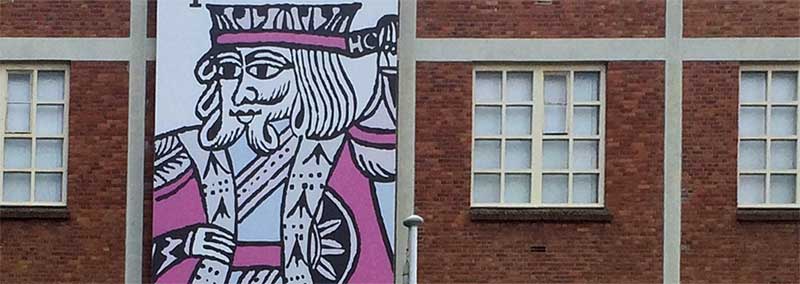
In 1983 the Nationaal Museum van de Speelkaart was established in Turnhout, housed in a former Mesmaekers annex. The museum contains historic manufacturing machinery, numerous exhibits with plenty of information and is well worth a visit.
In its technical presentation and the aesthetic aspect imparted to it, a playing card remains a faithful reflection of the period which produced it.
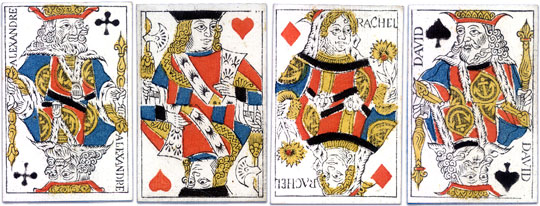
Above: double-ended provincial variant of the 'Paris' pattern which had spread to the Low Countries from Northern France, manufactured in Belgium, woodblock & stencil printing technology, c.1780-1810. See another example►
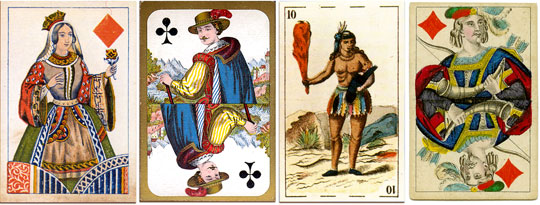
Above: assorted Belgian playing cards, 19th century: a) English style by Mesmaekers, b) Daveluy, 1870, c) Spanish-suited card, 4) Brepols & Dierckx & Son, c.1865.
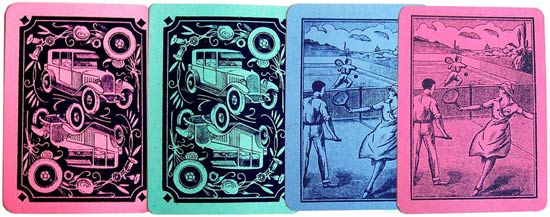
Above: assorted playing card designs, 20th century, by Biermans see more →
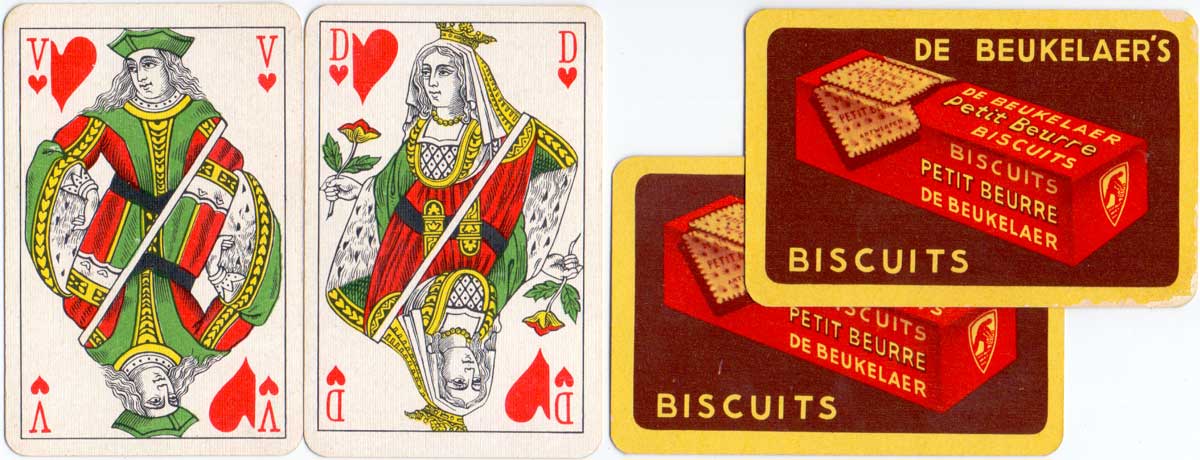
Above: Belgian pattern manufactured by Brepols for De Beukelaer’s Biscuits, c.1950.
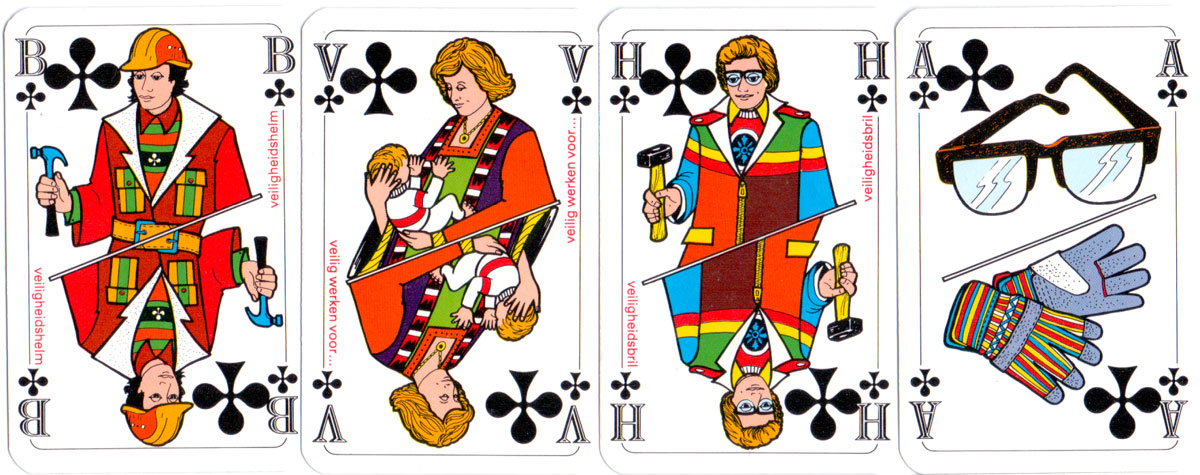
Above: BG Bouw Dutch Building Company publicity deck manufactured by Carta Mundi, c.1980.
REFERENCES
Autenboer, Dr Eugeen van: The Turnhout Playing Card Industry 1826-1976, Aurelia Books, Brussels 1976
Cremers, Filip: Kaartenmakers in Wallonië - Cartiers en Wallonie, Nationaal Museum van de Speelkaart, Turnhout, 1994
Turnhout: National Museum of the Playing Card►
Carta Mundi website (includes a history section).
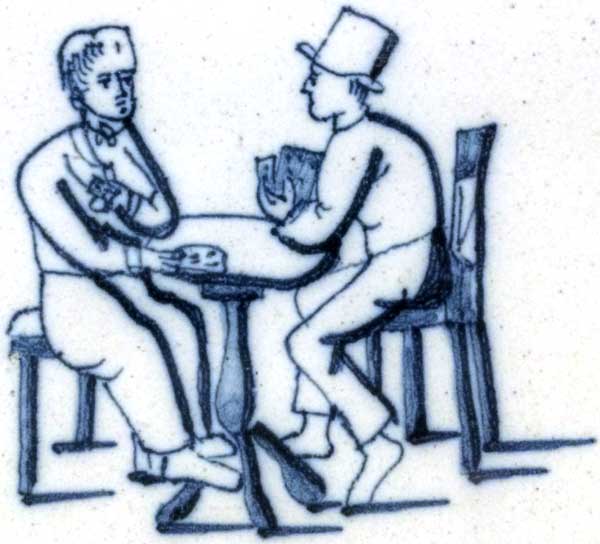
See also: Brepols & Dierckx 'Bongoût' with Scenic Aces for Brasil, c.1885 • Jeu de Cartes Estétique Nº1 • World War I Commemorative, 1919 • Biermans Scenic Aces for Brasil, c.1920 • A Todos Alumbra, c.1920 • Dilkhus, 1922 • Philips Arlita, 1925 • Brepols Scenic Aces for Brasil, c.1930 • L'Union Fait la Force, 1945 • Renée Sturbelle, 1947 • Low-Vision • Brussels Euro Joker Club 1998 • Superman • Carta Mundi Trumps Car Series • Carta Mundi Dutch pattern • Carta Mundi Spanish pattern • P&O European Shipping • P&O Stena Shipping • Fake Blanchard duty Ace of Spades.
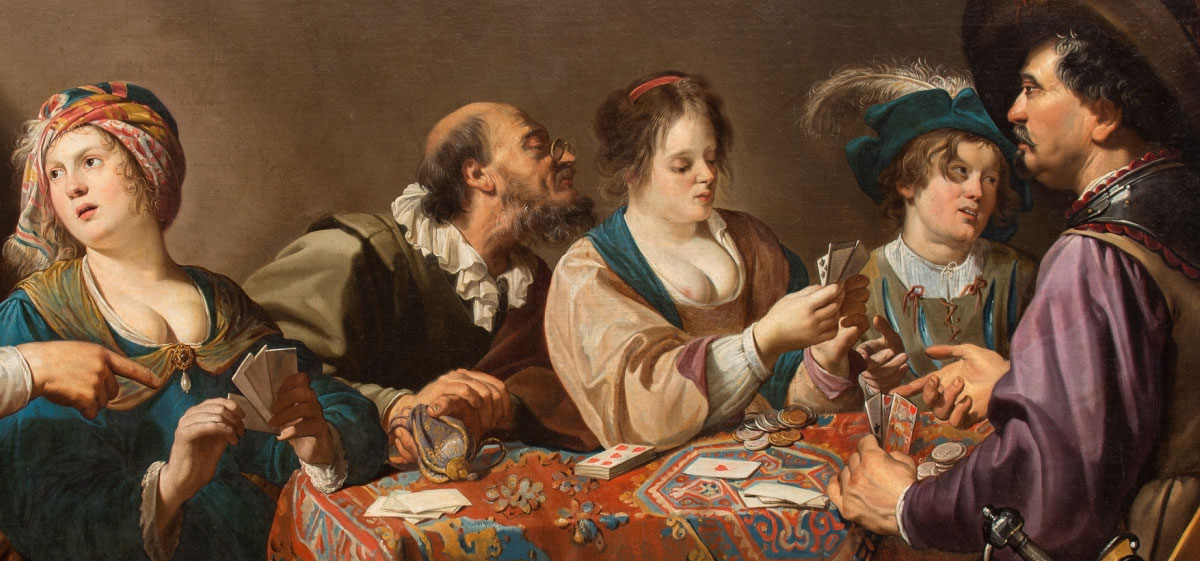
Above: detail from Card Players by Flemish painter Theodoor Rombouts, Museo del Prado, Madrid.
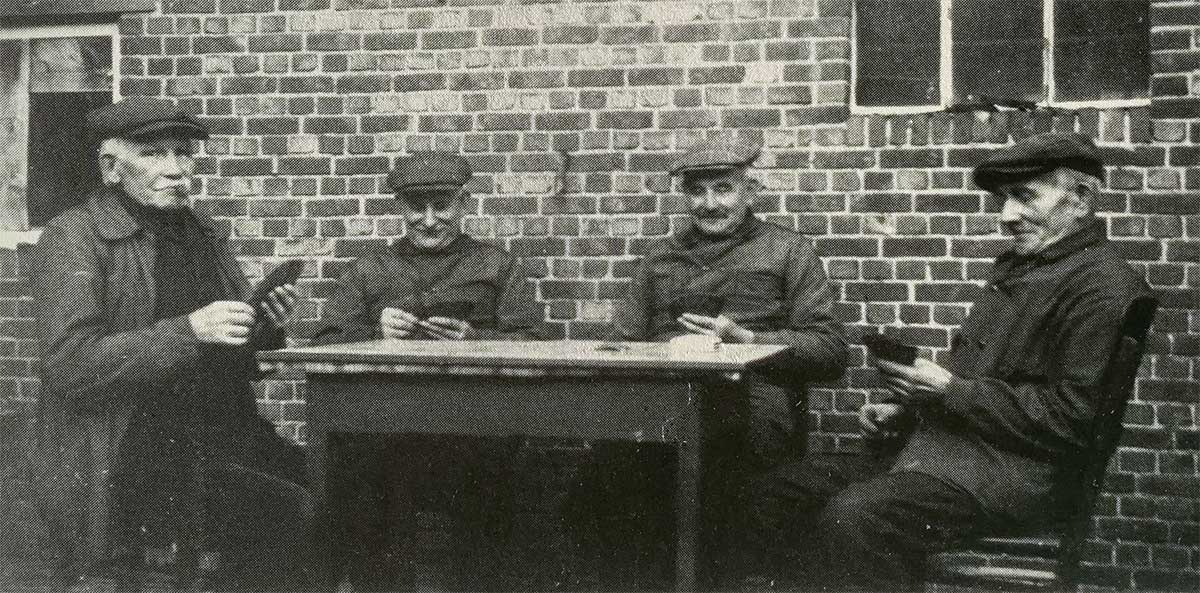
Above: card players at Loenhout, c.1950s.
Belgian beer labels
Connotations of playing cards and jokers from Belgian brewery.
We are born and all live in Turnhout. Turnhout is the playing card city of Belgium. We have the national playing card museum and of course the worldwide leader of playing card production, CartaMundi. So it was logical for us to work with playing card names for our beers. Het Nest Brouwerij►
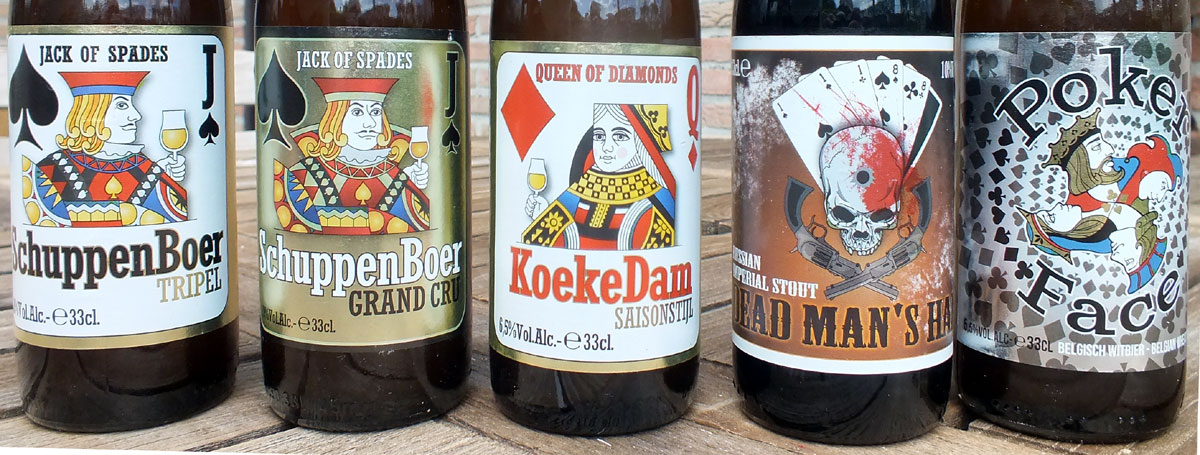
Above: playing card-themed beer labels, Het Nest Brouwerij, Turnhout, 2021. Turnhout is, of course, the city of playing cards.
• See also Het Nest Brouwerij playing cards►
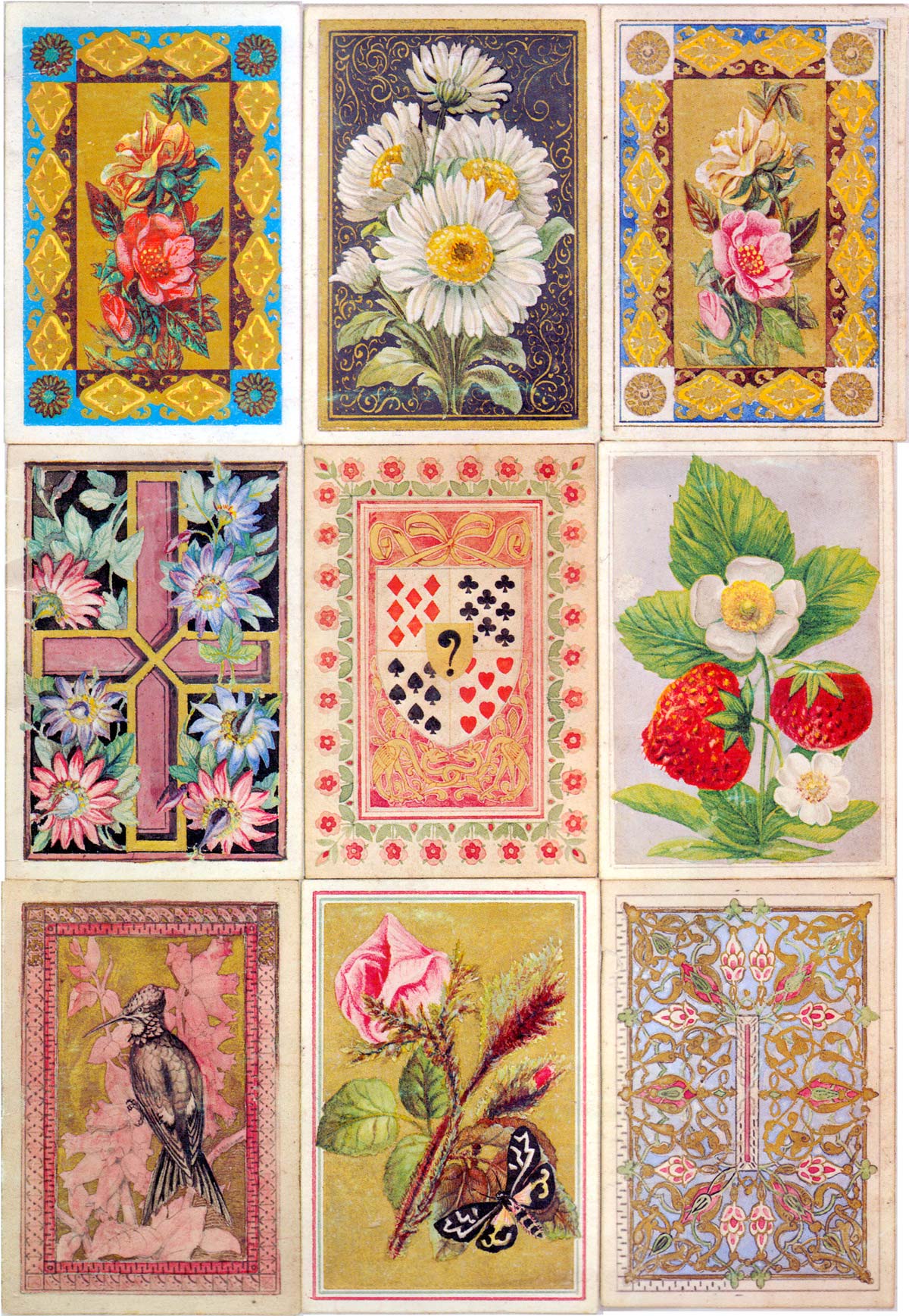

By Simon Wintle
Member since February 01, 1996
Founder and editor of the World of Playing Cards since 1996. He is a former committee member of the IPCS and was graphics editor of The Playing-Card journal for many years. He has lived at various times in Chile, England and Wales and is currently living in Extremadura, Spain. Simon's first limited edition pack of playing cards was a replica of a seventeenth century traditional English pack, which he produced from woodblocks and stencils.
Trending Articles
Popular articles from the past 28 days
Related Articles
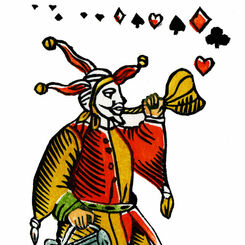
Woodblock and Stencil Joker
A limited edition art print of the 1984 woodblock joker.
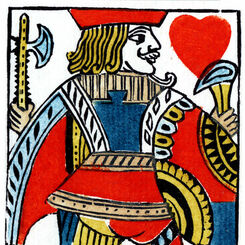
Woodblock and Stencil Jack of Hearts
A limited edition art print of the Jack of Hearts 1984 woodblock joker.
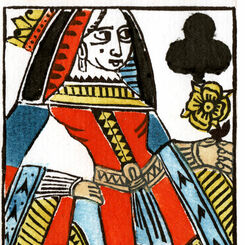
Woodblock and Stencil Queen of Clubs
A limited edition art print of the Queen of Clubs 1984 woodblock joker.
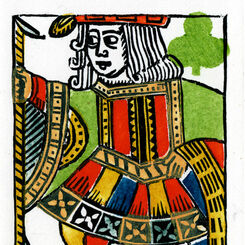
Woodblock and Stencil Jack of Clubs
A limited edition art print of the Jack of Clubs 1984 woodblock joker.
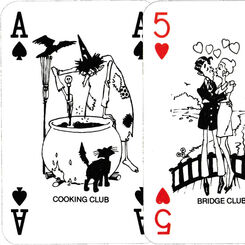
Club Soft Drinks
Promotional pack for Club soft drinks with amusing illustrations of different kinds of ‘club’.

High School Musical 3: Senior Year
American teen film depicting students staging their last spring musical.
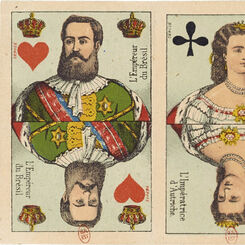
Jeu Quatre Empereurs
Brazilian scenic aces with emperors of Brazil, Austria and France and other dignitaries on the court...
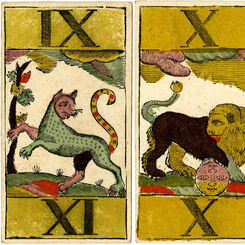
Animal Tarot by J. B Dubois
French-suited Bavarian Animal Tarot by J B Dubois, Liège, Belgium, late 18th C.
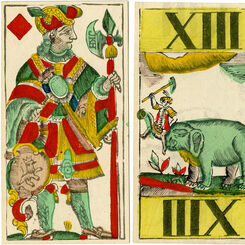
Animal Tarot by J. T Dubois
Early 19th century Animal Tarot pack produced by J T Dubois, Liège, Belgium.
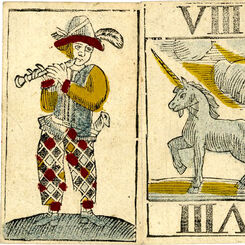
Animal Tarot by G. Larmoyer
Flemish Animal Tarot deck by G. Larmoyer, Liège, 1753.
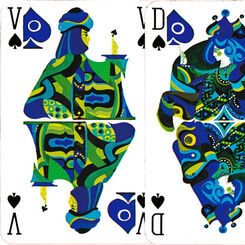
Louis De Poortere
Psychedelic designs promoting Louis De Poortere, a company selling carpets and rugs.
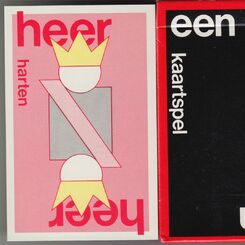
Een Kaartspel
Minimalist playing cards from The Netherlands
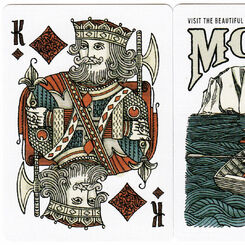
Old School Playing cards from Moon
Designed and published by Leo Scherfig
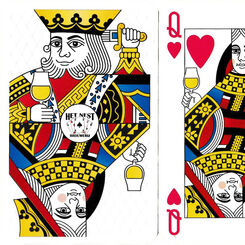
Het Nest Brouwerij
Het Nest Brouwerij playing cards from Turnhout, Belgium.
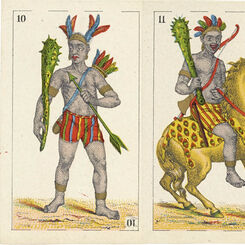
Des Quatre Parties du Monde
Four Corners of the World fantasy playing cards by Daveluy, Bruges, Belgium, 1875-1880.
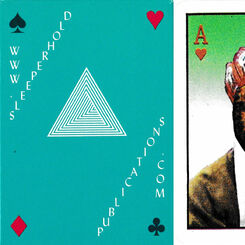
Sleeperhold Publications
Sleeperhold Publications collaborative art playing cards.
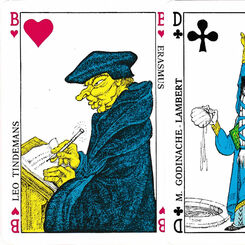
Commedia dell’Carte
Commedia dell’Carte political transformation cards illustrated by Stef van Stiphout, Belgium, 1977. ...
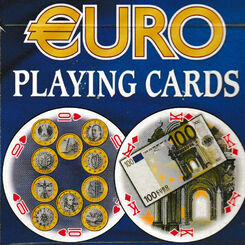
Euro Playing Cards
New euro banknotes and coins from several countries on circular cards.
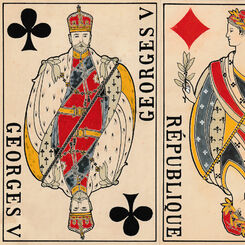
Maquettes for an unpublished WWI pack
Original designs depicting leaders and allegories from Russia, France, Great Britain and Belgium.
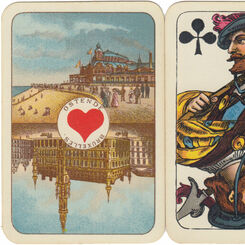
Belgian Souvenir playing cards
made in Germany by C.L. Wüst
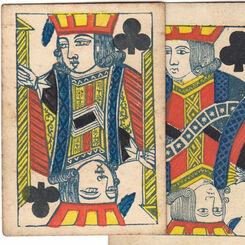
Isle of Man playing cards made by Glénisson of Turnhout
Two souvenir packs with different court cards made by Glénisson for the Isle of Man, c.1880.
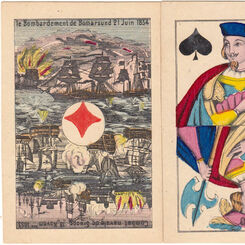
Bon Gout No.11 with Crimean War aces
Made by Mesmaekers & Moentack of Turnhout.
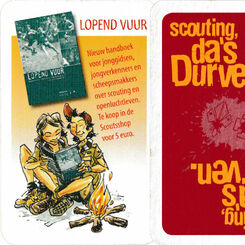
Scouting playing cards
Cartoon-style illustrations promoting a Belgian organisation for scouts and guides.
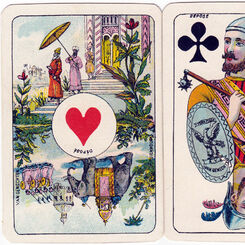
Neptune No.105 Playing Cards
An exotic pack made by A.Van Genechten of Turnhout
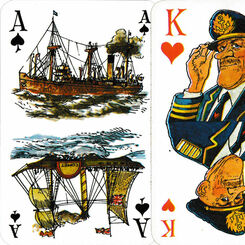
Sigma Coatings
Advertising pack for a company supplying marine paints.
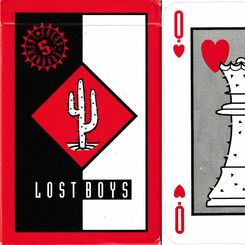
Lost Boys
Designs created on the occasion of a chess tournament in Antwerp, 1997.
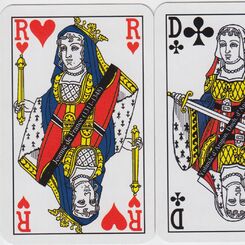
Les Cartes pour l'Égalité
Playing cards for gender equality, created on the 500th anniversary of classic French cards
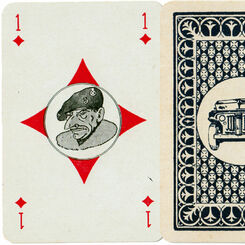
Jeep Playing cards
Pack of cards celebrating Allied Victory in the Second World War.
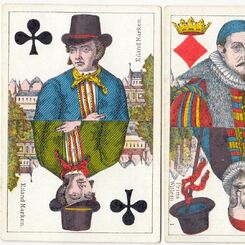
Dutch costume playing cards from an unknown maker
Another pack of Dutch costume playing cards c.1880.
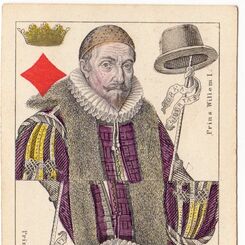
Dutch costume playing cards
Dutch costume playing cards made for the Dutch market in the second half of the 19th century.
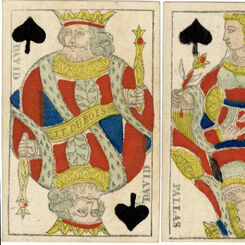
Dubois
Dubois card makers from Liège in the Walloon Region of Belgium.
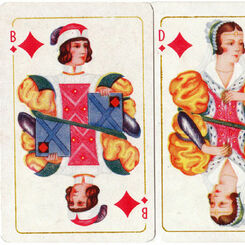
Luxus Skatkarte Nr.1134
Luxus Skatkarte Nr.1134 printed by Brepols for Germany, c.1940s.
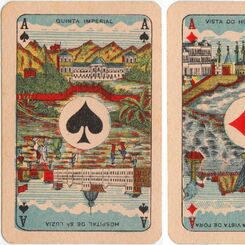
Brazil Pictorial Aces
Genoese pattern with Pictorial Aces for Brazil by Brepols, Turnhout, c.1920.
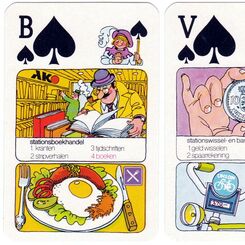
Stationskwartetspel
Railway Stations quartet game illustrated by Wim Dolk and published by Servex BV, Utrecht, 1975.
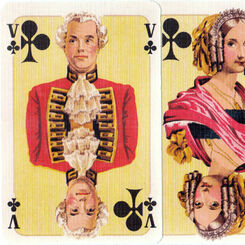
Dynastie Royale de Belgique
Dynastie Royale de Belgique by Mesmaekers, 1934.
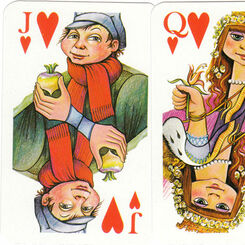
Year of the Child
Year of the Child commemorative deck designed by Jhan Paulussen, 1979.
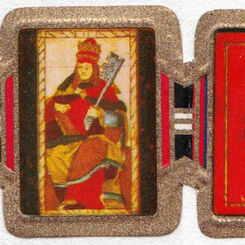
Cigar Bands
A collection of 24 cigar bands with miniature playing cards.
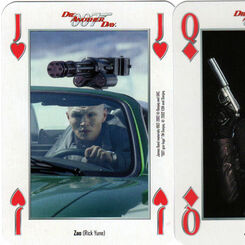
Die Another Day 007
“007 Die Another Day” James Bond themed playing cards, 2002.
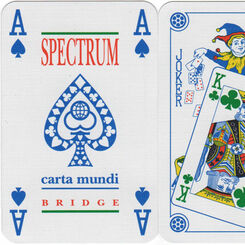
Spectrum Bridge by Cartamundi
Spectrum Bridge by Cartamundi
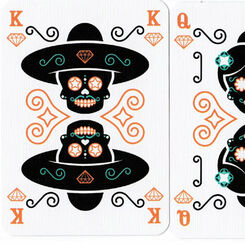
Calavera Playing Cards
Calavera playing cards designed by Jirs Huygen for Cartamundi, 2015
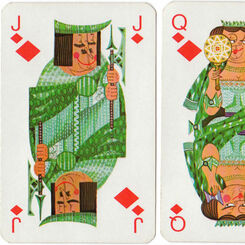
Belle Vue Gueuze
Promotional playing cards designed by Wim Simons, Belgium, 1960s.
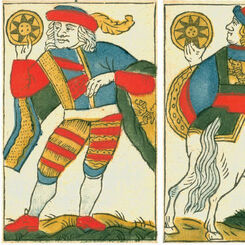
Anonymous Spanish Suited pack, c.1760
Anonymous archaic Spanish suited pack, c.1760.
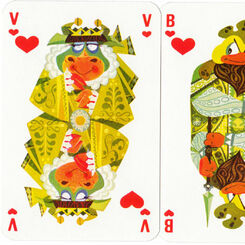
Boerenbond Veevoeders
Promotional deck designed by Ray Goossens for the Boerenbond farmers’ union, c.1968.
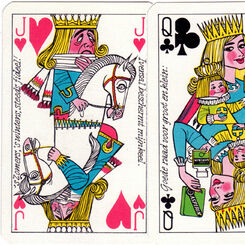
Bayer
Humorous pharmaceutical deck made by Antoine van Genechten for Bayer, c.1963.


